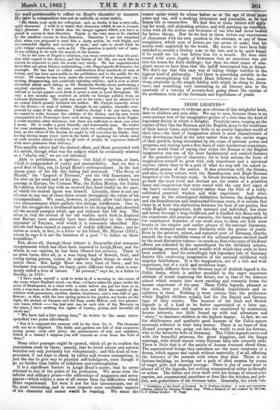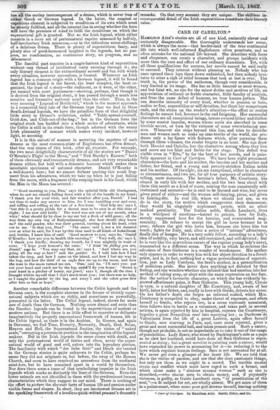IRISH LEGENDS.* WE shall never cease to welcome new editions
of this delightful book, dear to children and men alike. We say to men, because there is no more curious test of the imaginative genius of a race than the kind of legendary fiction in which it delights. Practical races, verging on the matter-of-fact like the Romans and the English, keep to the traditions of their heroic times, and create little or no purely legendary world of their own—the kind of imagination which is most characteristic of them developing itself at the later rather than at the earlier stages of their growth, being stimulated by the sense of national power and progress, and resting upon a firm basis of calm intellectual experience. No one would think of saying that either the Roman or the English imagination was one of the most fundamental and marked features of the primitive type of character, for in both nations the force of imagination seemed to grow with rich experience and a universal culture, rather than to be a part of what we may call the naked in- tellectual genius of the nation. It was otherwise with the Greeks, and also, to some extent, with the Scandinavian and High German branches of the Teutonic stock. In Greek literature, the further you. go back the more vivid and distinct are the traces of a primitive fancy and imagination that.were coeval with the very first signs of the race's existence and vitality rather than the fruit of a richly. cultivated practical wisdom and wide experience. And what- ever may be the ethnological distinction between the Anglo-Saxon and the Scandinavian and continental German races, it is certain that there is at least this distinction between the bent of our genius, that while English imagination, both national and individual, lies mute and latent through a long childhood, and is kindled into flame only by the experience and passions of maturity, the fancy and imagination of the continental branches of our stock seem to shine out with most beauty in the simpler and earlier phases of the national literature, and to be stamped much more distinctly with the genius of youth. Even in the greatest, wisest, and maturest poet of Germany, Goethe himself, the true childlike stamp of the national genius showed itself by the most distinctive tokens—so much so, that even some of his finest efforts are ridiculed by the unintelligent for the childishly minute, painstaking, earnest, wide-eyed wonder with which they seem to have been marked. And the exceedingly rich legendary lore of Germany depicts this awakening imagination of the national childhood with singular faithfulness. It is the imagination, not of a rich and wide experience, but of a vivid mid credulous hope.
Curiously different from the German type of childish legend is the Celtic fancy, which is neither moulded in the eager expectant attitude of minds exploring the future, nor in that of the maturer school which recasts into more exciting and romantic forms the human experience of the past. These Celtic legends, pleasant as they are, have yet little of the childish hopefulness and in- spiration in them. Nothing is more certain than the preference which English children usually feel for the Danish and German type of fairy stories. The humour of the Irish and Scotch legends is of a kind to be better appreciated at a later age, and the fancifulness and caprice are too unrelieved by continuous human interests, too little bound up with real adventure and "story," to fascinate children in the highest degree. In fact, we see the shiftlessness and apathetic good humour of the Celtic nature curiously reflected in their fairy stories. There is no trace of that ill-used youngest son going out into the world to seek his fortune, who is the favourite hero in Germany. The Celtic legends never end with the beautiful princess, the great kingdom, and the happy marriage, with which almost every German fairy tale properly ends. There is little that is of the nature of human romance about them. The supernatural beings they introduce are the mere creatures of a dream, which appear and vanish without materially, if at all, affecting the fortunes of the mortals with whom they deal. There is no fortune-building, no hewing out a path of ideal success by means of magic gifts and staunch courage. There is fun of some kind in almost all of the legends, but nothing consequential either in thought or action. The fairies and elves dealt with are beings of almost pure caprice, not supernatural guardians or foes like the witches, and gob- lins, and godmothers of the German tales. Generally, the whole tale • Traditions of the South of Ireland By T. Crofton Croker. A new and complete edition, edited by Thomas Wright, Esq. With a Memoir of the Author by his Son, T. F. Dillon Croker. W. Tegg.
has all the motley inconsequence of a dream, which is never true of either Greek or German legend. In the latter, the magical or capricious element is subjected to conditions of its own which must be strictly fulfilled, and all the interest lies in seeing whether the hero will have the presence of mind to fulfil the conditions on which the supernatural gift is granted. Not so the Irish legend, which either consists in a mere act of preternatural caprice seasoned by half-sly, half-involuntary Irish nonsense,—or in the ridiculous scene-shiftings of a delirious dream. There is plenty of superstitions fancy, and plenty also of good-humoured laughter in the legends, but no pur- pose, no combination, no continuous story, no progress, and no dineuernent.
The fanciful part consists in a magic-lantern kind of superstition without 'any thread of intellectual unity running through it ; the only literary element is the extraordinary naivete and fun with which every situation, however anomalous, is treated. Wherever an Irish legend has a common origin with a German legend, it will be found that the Irish legend is the barest, the least complex, the least or- ganized, the least of a story—the rudiment, as it were, of the other, yet treated with more joyousness—showing, perhaps, that though it is derived from the original stock, it has passed through a much less creative and formative national mind than the other. Thus, in the very amusing "Legend of Bottle-hill," which is the nearest approach to a connected fairy tale of the German type that we find in these South-Ireland legends, we have the primitive form of that delightful little story in Grimm's collection, called "Table-spread-yourself, Gold-Ass, and Club-out-of-the-bag ;" but in the German form the original stock has budded into a whole series of adventures, while the Celtic is still in its crude form, though adorned with the sunny Irish pleasantry of manner which makes every incident, however light, so amusing.
It is in this naivete of manner in narrating the caprices of such dreams as the most common-place of Englishmen has often dreamt, that the real charm of this book, after all, consists. For example, the two most delightfully characteristic of all the stories are "Daniel O'Rourke's Flight to the Moon," and "Ned Sheehy's Excuse," both of them obviously and transparently dreams, and not very remarkable dreams either, but told with a dramatic humour which makes them inimitable specimens of national character. Daniel O'Rourke is a well-known hero; but we cannot forbear quoting this small frag- ment from his adventures, which we take up when he is just falling from the moon, with a fragment of the reaping-hook in his hand, which the Man in the Moon has severed; "'Good morning to you, Dan,' says the spiteful little old blackguard, when he saw me cleanly falling down with a bit of the handle in my hand ; I thank you for your visit, and fair weather after you, Daniel.' I had not time to make any answer to him, for I was tumbling over and over, and rolling and rolling at the rate of a fox-hunt. God help me,' says I, 'but this is a pretty pickle for a decent man to be seen in at this time of night : I am now sold fairly.' The word was not out of my mouth, when whiz ! what should fly by close to my ear but a flock of wild geese ; all the way from my own bog of Ballyasheenough, else how should they know me? the °add gander, who was their general, turning about his head, cried out to me, Is that you, Dan?' 'The same,' said I, not a bit daunted now at what he said, for I was by this time used to all kinds of bedevilment, and, besides, I knew him of maid. Good morrow to you,' says he, Daniel O'Rourke: how are you in health this morning?' 'Very well, sir,' says I, I thank you kindly,' drawing my breath, for I was mightily in want of some. 'I hope your honour's the same.' 'I think 'tis falling pots are, Daniel,' says he. 'You may say that, sir,' says I. And where are you going all the way so fast ?' said the gander. So I told him how I had taken the drop, and how I came on the island, and how I lost my way in the bog, and how the thief of an eagle flew me up to the moon, and how
the man in the moon turned me oat.'Den,' said he, save you: put out your hand and catch me by the leg, andel'll fly you home.' 'Sweet is your hand in a pitcher of honey, my jewel,' says I, though all the time I thought within myself that I don't much trust you ; but there was no help, so I caught the gander by the leg, and away I and the other geese flew after him as fast as hops."
Another remarkable difference between the Celtic legends and the German ones, is the complete absence in the former of strictly super- natural subjects which are so richly, and sometimes so powerfully, presented in the latter. The Celtic legend, indeed, shows far more awe of death than the German. Nothing more dismal and eerie than the Banshee legends can be found in the superstitions of ancient or modern nations. But there is as little effort to conceive or delineate imaginatively the properly supernatural framework of human life in the Celtic legend, as there is in the Arabian. In Greece, and again in Germany, we find Time, Eternity, Necessity, Death, God, Satan, Heaven and Hell, the Supernatural Justice, the vision of "naked souls," occupying a prominent position in the imagination of the legend makers. But in the Irish legends the scene closes with death, and only the preternatural world of fairies and elves, never the super- natural world of good and evil, enters into the legendary picture. The familiarity with which" der liebe Gott" and Death are treated in the German stories is quite unknown to the Celtic, perhaps be- cause they did not originate in, but before, the sway of the Roman Church, and seem to have received no accessions from the mediseval saint-lore, but to have remained apart in a world by themselves. Nor does there seem a trace of that symbolizing impulse in the Trish legends which marks so distinctly the finer of the German. Even the lower animals are not identified in them with the predominant human characteristics which they suggest to our mind. 'There is nothing of the effort to picture the ahstract facts of human life and passion under visible forms and shapes. In short, they are incoherent dreams set in the sparkling framework of a heedless quick-witted peasant's dramatic
remarks. On that very account they are unique. The shiftless in- consequential detail of the Irish superstitions constitute their literary value.































 Previous page
Previous page